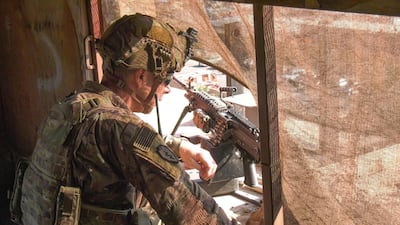The US government’s accusation that Iran was directly involved in the attack on the American embassy in Baghdad goes further than ever in laying blame for Tuesday’s attack on Tehran.
US special representative Brian Hook told The National that the attack was orchestrated by Iran and confirmed that US officials had identified a direct link.
Thousands of supporters of an Iranian-backed militia chanting anti-US slogans breached the embassy's compound, threw petrol bombs and daubed pro-Iranian slogans on the walls before withdrawing after a 24-hour siege.
Mr Hook did not reveal the evidence held by the US but said: “Iran organises, trains and equips Shiite military proxies and we do not make a distinction between the Iranian regime and Iranian militias.
“Any attack by an Iranian militia, the Iranian regime will be held accountable.”
Mr Hook said the situation was “relatively calm” on Wednesday and expected that security would improve with new US troops and Iraqi security posted to the area.
He said the withdrawal, ordered by the leaders of the militia that had been designated a terrorist organisation by the US, was a positive development.
“These were not protesters, they were terrorists,” Mr Hook said. “They were leaders of various terrorist organisations and they appeared at our embassy.
"It should not be confused with the legitimate Iraqi protesters who have been out in the streets since October."
He chided the government of Iraqi Prime Minister Adel Abdul Mahdi for security failures that allowed the protesters into the protected compound.
“The US relies on the Iraqi government to do two things – protect our embassy and our soldiers," Mr Hook said.
"There have been 11 military strikes in two months against our bases, which are there to ensure defeat of ISIS."
The Iraqi government has posted more troops near the embassy after calls from US President Donald Trump and Secretary of State Mike Pompeo to Mr Abdul Mahdi.
Mr Hook rejected suggestions that the attack on the embassy and the 24-hour occupation showed the US administration’s policy of maximum pressure on Iran was failing.
He said the policies of sanctions, military action and cancelling the nuclear deal under Donald Trump had “put the regime in a state of panicked aggression and it’s now lashing out in places like Saudi Arabia and Baghdad”.
Mr Hook dismissed suggestions that the US had not been targeted under the administration of Barack Obama, who struck the 2015 nuclear deal with Tehran and world powers.
“The people who claim that don’t know their history,” he said.
“In the period that the nuclear deal was negotiated and implemented, there were 72 separate acts of Iranian terrorism, terrorist threats, regional aggression, violation of UN arms embargo and cyber attacks.”
The US carried out military strikes against Kataib Hezbollah on Monday after it killed an American contractor in a rocket attack on a Kirkuk base.
“If we had not conducted those strikes, it would only have tempted Iran to increase the number and scale of its attacks,” Mr Hook said.
He expected more sanctions to be imposed on Iran, and described the government as isolated and running out of money.
Mr Hook would not say whether the US would withdraw its troops from Iraq if the attacks continued.
“We don’t preview our military options but there will be additional sanctions on Iran,” he said.
Daniel Serwer of Johns Hopkins University, who has criticised the Trump administration’s approach, said the embassy attack was a severely damaging blow given the scale of the US presence in Iraq.
Mr Serwer said that Iraq was far more important than Libya as a major oil producer and a "front-line state" for Iran.
“Thousands of American lives and trillions of dollars have been spent to ensure a friendly and semi-democratic government, as well as to secure a competitive foothold in Iraq, where 5,000 or so US troops are still training Iraqi security forces,” he wrote.
“US withdrawal from Iraq would constitute a major Iranian victory, allowing Tehran to consolidate its access to Syria and Lebanon, as well as the Mediterranean.”
Mr Serwer said the embassy would not be able to function as before but it was unlikely that more US troops would be withdrawn.
“The additional US troops being sent may be able to prevent any deaths or capture of Americans, but they won’t be able to restore the embassy to normal functionality,” he said.
“Evacuation of most of the civilians is likely.”









